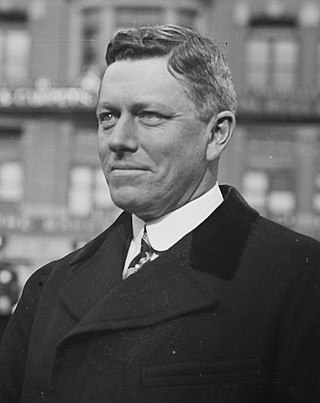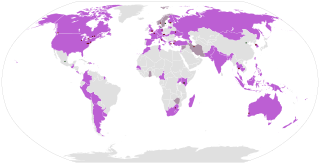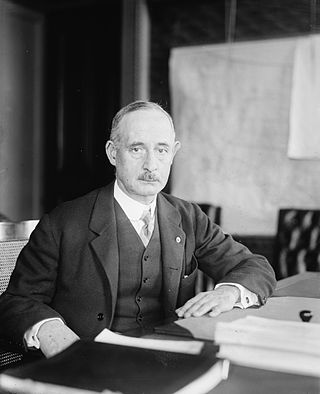
A world's fair, also known as a universal exhibition or an expo, is a large global exhibition designed to showcase the achievements of nations. These exhibitions vary in character and are held in different parts of the world at a specific site for a period of time, typically between three and six months.
The Institute of International Law is an organization devoted to the study and development of international law, whose membership comprises the world's leading public international lawyers. The organization is generally considered the most authoritative world academy of international law. It was awarded the Nobel Peace Prize in 1904.
The International Congress of Mathematicians (ICM) is the largest conference for the topic of mathematics. It meets once every four years, hosted by the International Mathematical Union (IMU).

George Brinton McClellan Jr., was an American politician and historian. He was elected as the 93rd Mayor of New York City, serving from 1904 to 1909. He was the son of Civil War general George B. McClellan, who was an 1864 Democratic presidential candidate, and his wife.

The Provisional Congress of the Confederate States, also known as the Provisional Congress of the Confederate States of America, was a unicameral congress of deputies and delegates called together from the Southern States which became the governing body of the Provisional Government of the Confederate States from February 4, 1861, to February 17, 1862. It sat in Montgomery, Alabama, until May 21, 1861, when it adjourned to meet in Richmond, Virginia, on July 20, 1861. In both cities, it met in the existing state capitols which it shared with the respective secessionist state legislatures. It added new members as other states seceded from the Union and directed the election on November 6, 1861, at which a permanent government was elected.

The International Transport Workers' Federation (ITF) is a democratic global union federation of transport workers' trade unions, founded in 1896. In 2017 the ITF had 677 member organizations in 149 countries, representing a combined membership of 19.7 million transport workers in all industrial transport sectors: civil aviation, dockers, inland navigation, seafarers, road transport, railways, fisheries, urban transport and tourism. The ITF represents the interests of transport workers' unions in bodies that take decisions affecting jobs, employment conditions or safety in the transport industry.

The Red International of Labor Unions, commonly known as the Profintern, was an international body established by the Communist International (Comintern) with the aim of coordinating communist activities within trade unions. Formally established in 1921, the Profintern aimed to act as a counterweight to the influence of the so-called "Amsterdam International", the social-democratic International Federation of Trade Unions, an organization which the Comintern branded as "class-collaborationist" and as an impediment to revolution. After entering a period of decline in the middle 1930s, the Profintern was finally dissolved in 1937 with the advent of Comintern's "Popular Front" policy.

The International Council of Women (ICW) is a women's organization working across national boundaries for the common cause of advocating human rights for women. In March and April 1888, women leaders came together in Washington D.C., with 80 speakers and 49 delegates representing 53 women's organizations from 9 countries: Canada, the United States, Ireland, India, United Kingdom, Finland, Denmark, France and Norway. Women from professional organizations, trade unions, arts groups and benevolent societies participate. National councils are affiliated to the ICW and thus make themselves heard at the international level. The ICW enjoys consultative status with the United Nations and its Permanent Representatives to ECOSOC, ILO, FAO, WHO, UNDP, UNEP, UNESCO, UNICEF, UNCTAD, and UNIDO.
The World Congress of Accountants (WCOA) has been held under the auspices of the International Federation of Accountants (IFAC), the worldwide organization for the accountancy profession, every five years since 1952 and every four years since 2002. The host organization rotates every four years to a different national professional accounting organization, chosen by an IFAC selection team. The objective of the team is to select the candidate most likely to host a financially and otherwise successful World Congress and surrounding program. Selection criteria include the abilities and experience of the member body and the professional conference organizers in organizing such events; the suitability of the proposed venue; and the attractiveness to potential delegates of the venue and of the country in which it is situated; among other criteria.

Theron Akin was an American politician who served one term as a U.S. Representative from New York from 1911 to 1913.

William Barclay Charles was an American politician from New York.

Jonathan Mayhew Wainwright was an American lawyer and politician from New York. He was the United States Assistant Secretary of War from 1921 to 1923.

The International Alliance of Women is an international non-governmental organization that works to promote women's rights and gender equality. It was historically the main international organization that campaigned for women's suffrage. IAW stands for an inclusive, intersectional and progressive liberal feminism on the basis of human rights and liberal democracy, and has a liberal internationalist outlook. IAW's principles state that all genders are "born equally free [and are] equally entitled to the free exercise of their individual rights and liberty," that "women's rights are human rights" and that "human rights are universal, indivisible and interrelated." In 1904 the Alliance adopted gold as its color, the color associated with the women's suffrage movement in the United States since 1867 and the oldest symbol of women's rights; through the Alliance's influence gold and white became the principal colors of the mainstream international women's suffrage movement.
The International Congress of Americanists (ICA) is an international academic conference for research in multidisciplinary studies of the Americas. Established August 25, 1875 in Nancy, France, the scholars' forum has met regularly since its inception, presently in three year increments, with the exception of during the conflict of World War II. Its meeting location alternates between Europe and the Americas. Congress members come from a variety of disciplines, including anthropology, archaeology, art, education, economy, geography, history, human rights, law, philosophy, linguistics, sociology, and urban studies.

The International Congress of Women was created so that groups of existing women's suffrage movements could come together with other women's groups around the world. It served as a way for women organizations across the nation to establish formal means of communication and to provide more opportunities for women to ask the big questions relating to feminism at the time. The congress has been utilized by a number of feminist and pacifist events since 1878. A few groups that participated in the early conferences were The International Council of Women, The International Alliance of Women and The Women's International League for Peace and Freedom.

The 1904–05 United States Senate elections were held on various dates in various states, coinciding with President Theodore Roosevelt's landslide election to a full term and the 1904 House of Representatives elections. As these U.S. Senate elections were prior to the ratification of the Seventeenth Amendment in 1913, senators were chosen by state legislatures. Senators were elected over a wide range of time throughout 1904 and 1905, and a seat may have been filled months late or remained vacant due to legislative deadlock. In these elections, terms were up for the senators in Class 1.

Jeni Bojilova-Pateva, also transliterated as Zheni Bozhilova-Pateva, was a Bulgarian teacher, writer, women's rights activist, and suffragist, who became involved in the pacifist movement. After graduating with teaching credentials in 1893, she began her profession, but was barred from teaching when a law was passed in 1898 that limited the rights of married women. She turned to activism and journalism, becoming involved in the international women's movement that year. A highly prominent feminist, she was one of the founders of the Bulgarian Women's Union in 1901. During 1905 in Burgas, she founded "Self-Awareness", a feminist group, and served as its chair for 25 years. As editor of the Women's Voice she published articles on developments in the women's movement in Bulgaria and abroad, as well as about issues affecting women. Throughout her career, she published over 500 articles and books.

The Association internationale antimilitariste was a pacifist association founded in Amsterdam in 1904 that was dedicated to fighting militarism. Although technically open to all political views, it was dominated by anarchists. The members agreed that the workers should revolt if war were declared, but disagreed on whether soldiers should desert. They were subjected to police surveillance and arrests. By 1908 the association had few remaining members.

Second Conference of the International Woman Suffrage Alliance was held in Berlin, Germany in June 1904. The main features of the second conference were the formation of "The International Woman Suffrage Alliance," and the adoption of the Declaration of Principles.
Fourth Conference of the International Woman Suffrage Alliance was held from 15 - 21 June 1908, at the Concertgebouw, Amsterdam, Netherlands.

















